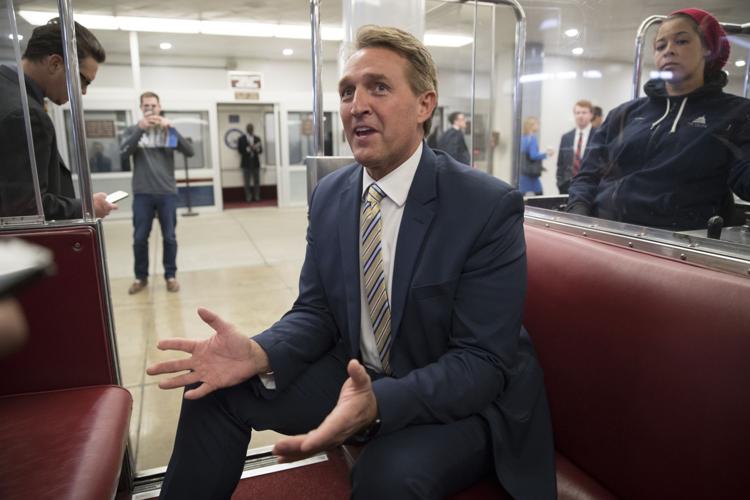After Sen. Jeff Flake mentioned Josef Stalin in his speech last week, his thoughts about truth and shared facts were never going to receive much notice.
Flake referred to Stalin, as you may know, in a Jan. 17 speech on the Senate floor denouncing President Trump’s efforts to undermine critical news coverage of him. He said that Trump was echoing Stalin when he referred to the press as “enemies of the people” and more broadly shaking the foundation of our democracy.
Some people, especially Flake’s critics, made a big deal out of the Stalin reference, but what Flake was really talking about was protecting truth and making decisions on a shared set of facts.
It’s an issue that’s coming clearer after the bizarre election campaign of 2016 and the strange first year of the Trump presidency.
“I rise today,” Flake said, “to talk about the truth, and its relationship to democracy. For without truth, and a principled fidelity to truth and to shared facts, Mr. President, our democracy will not last.”
That was perhaps a little exaggerated — our democracy has survived a lot of lies in the past — but it echoed some big concerns that have become urgent lately. Namely, much of the electorate, and even our elected officials, are living in different political realities, with different sets of facts that they’re acting upon.
This problem was spelled out in a recent report from the Rand Corp., cleverly called “Truth Decay.” The authors cite four causes of the deteriorating acceptance of truth and shared facts. They are:
- Confirmation bias and other ways of resisting unwanted truths.
- Changes in the way we receive information, such as the rise of social media and 24-hour news cycles.
- Reduced emphasis in schools on civics, media literacy and critical thinking.
- Increased social polarization.
“This shift away from facts and data in political debate and policy decisions has far-reaching implications,” the authors said. “It erodes civil discourse; weakens key institutions; and imposes economic, diplomatic and cultural costs.”
One of the authors, Rand Corp. researcher Jennifer Kavanagh, told me: “When policies aren’t grounded in facts, it can be difficult to come to a compromise. Not only do we have different opinions, we have different facts.”
Perhaps the most consequential example of this is the climate-change debate. On Thursday, the Weather Channel’s website tried to establish facts about the warming climate.
The main headline: “THERE IS NO CLIMATE CHANGE DEBATE.” The associated stories explain how the changing climate is already affecting people in the 50 states.
The Weather Channel is not, some left-wing propaganda outlet. But of course, its display of facts is very unlikely to be accepted let alone acted upon in the White House.
While the broader situation is disturbing, we shouldn’t consider it unprecedented. The Rand report points to the 1880s-1890s, the 1920s-1930s and the 1960s-1970s as periods when some of the same factors contributing to truth decay were present.
One of the realities in all three of those periods and today: “Declining trust in formerly respected sources of factual information.”
Although I work for one of those sometimes disrespected sources of factual information, I find myself less worried than Flake was in his speech about the likely outcome of our current factual rootlessness.
“We are a mature democracy,” Flake said. “It is well past time that we stop excusing or ignoring — or worse, endorsing — these attacks on the truth. For if we compromise the truth for the sake of our politics, we are lost.”
My sincere hope and expectation that facts will win out despite the decay of truth in our society, and despite the temptation to accept and spread lies for the sake of a political win.
Tucson’s poor growth
If you’ve followed our reporting on Tucson’s economy, you know its performance has been disappointing. But was it really the worst in the country?
An analysis of the Bureau of Economic Analysis data by a company called Headlight Data found that among the 53 largest metro areas in the country, Tucson had the poorest economic growth in the period from 2011-2016. Our gross regional product, a measure of economic growth at the metropolitan level, fell by 3.7 percent in that period, the report says.
San Jose, California, Austin and San Antonio, Texas, topped the list, with whopping growth over 30 percent. The other bottom dwellers were Rochester, New York (down 1.4 percent), and Hartford, Connecticut (down 1.3 percent).
I asked UA economist George Hammond, of the Eller School, whether he thinks the ranking is accurate, and he said it may well be. Measures of local domestic product aren’t precise, he said, but that one seems to reflect the same decreased federal-government spending that has affected Tucson’s job market and personal income, which are more reliable measures.
Candidate back in CD1
Wendy Rogers is making another run at the GOP nomination in Congressional District 1, the sweeping district that includes much of the northwestern Tucson metro area as well as Pinal County and eastern Arizona, up to the Utah border.
Rogers ran in 2016 and took third place in a six-person race for the GOP nomination, winning 22 percent of the vote, compared to winner Paul Babeu’s 31 percent.
“Our nation’s very identity and history are under attack, with liberals trying to erase Columbus and Washington and Jefferson,” Rogers said in a campaign announcement in Sedona this week. That’s the hometown of incumbent Tom O’Halleran, a Democrat who is running for re-election.
Moon-cycle quackery
I hate to be the one to break the news to you, but there is some serious moon-cycle quackery going on next month.
In February, there will be no full moon.
Yes, the next full moon will be Jan. 31. And the one after that? March 1.
I don’t know who approved this, but you can be assured I will be filing public-records requests to find out.





